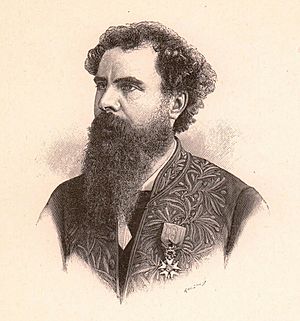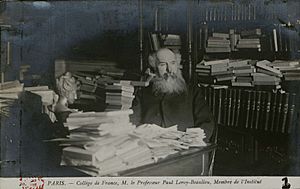Pierre Paul Leroy-Beaulieu facts for kids
Pierre Paul Leroy-Beaulieu (born December 9, 1843, in Saumur; died December 9, 1916, in Paris) was an important French economist. An economist studies how people and countries make, use, and manage money and resources. He was the brother of Henri Jean Baptiste Anatole Leroy-Beaulieu, who was a historian.
Pierre Paul Leroy-Beaulieu studied in Paris at the Lycée Bonaparte and the École de Droit. He also studied in Germany, in the cities of Bonn and Berlin. When he returned to Paris, he started writing for several well-known magazines and newspapers like Le Temps.
Contents
Early Achievements
Pierre Paul Leroy-Beaulieu was very smart and won many awards for his writings. In 1867, he won a prize from the Academy of Moral and Political Sciences. His winning essay was about how the thoughts and feelings of workers affect their wages.
In 1870, he won three more prizes for his essays. These essays covered topics like how countries set up colonies, how France and England manage their governments, and the economic effects of land taxes.
Teaching and Leadership
In 1872, Leroy-Beaulieu became a professor of finance. He taught at the new École Libre des Sciences Politiques, a famous school for political studies. Later, in 1880, he took over a special teaching position at the Collège de France. This was a very important role in political economy, following in the footsteps of his father-in-law, Michel Chevalier.
In his later years, from 1911 to 1916, he helped lead the Société d'économie politique. This was a group for people interested in economic ideas.
Important Books and Ideas
Many of Leroy-Beaulieu's books were well-known even outside of France. One important series of studies, published between 1863 and 1869, was called Recherches économiques, historiques et statistiques sur les guerres contemporaines. In these books, he calculated how many people and how much money were lost during the big wars in Europe.
He also wrote many other influential books, including:
- La Question monnaie au dix-neuvieme siècle (1861), about money in the 1800s.
- La Travail des femmes au dix-neuvième siècle (1873), about women working in the 1800s.
- Traité da la science des finances (1877), a detailed book about finance.
- Essai sur la répartition des richesses (1882), about how wealth is shared.
- Le collectivisme (1885), where he discussed collectivism, an idea where the community owns and controls things.
- L'Algérie at la Tunisie (1888), about the countries of Algeria and Tunisia.
- Précis d'économie politique (1888), a summary of political economy.
- L'Etat moderne et ses fonctions (1889), about the modern government and its roles.
In 1873, he also started his own economic magazine called Économiste français. He was a strong believer in traditional economic ideas. He was also a major opponent of protectionism (which means protecting a country's own industries by taxing foreign goods) and collectivism.
International Recognition
Pierre Paul Leroy-Beaulieu was recognized for his work by important groups around the world. In 1880, he was chosen as a member of the Royal Swedish Academy of Sciences. The next year, in 1881, he was elected to the American Philosophical Society. These honors showed how respected his economic ideas were internationally.
Family Connections
Pierre Paul Leroy-Beaulieu's brother was Henri Jean Baptiste Anatole Leroy-Beaulieu (1842-1912). Henri was also a well-known writer and historian.
See also
 In Spanish: Pierre Paul Leroy-Beaulieu para niños
In Spanish: Pierre Paul Leroy-Beaulieu para niños
 | Anna J. Cooper |
 | Mary McLeod Bethune |
 | Lillie Mae Bradford |



